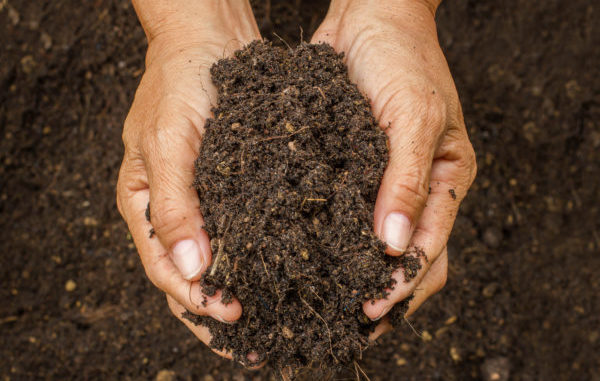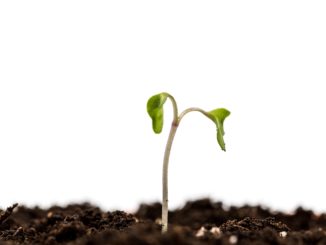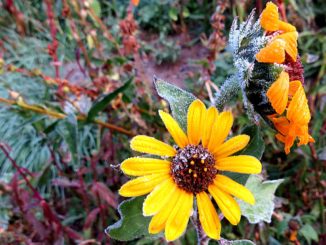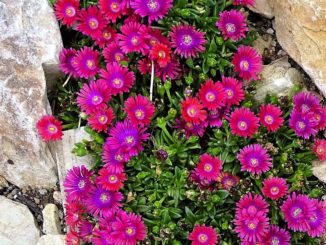
Sustainable living, gardening, and farming is based on an understanding of ecosystems, the study of relationships between organisms and their environment. It has been defined as an integrated system of plant and animal production practices that will last over time. Having a harmonious relationship with Gaia (Mother Earth) provides food for people, enhances the natural environment upon which the community depends, makes efficient use of resources and integrates natural cycles that sustain economic viability as well as enhances the quality of life for the community as a whole.
Soil is a living, complex life giving system beneath our feet which our lives are linked. It is hard to believe but there are a billion microbes in one cup of soil. Soil and its fertility depend on the vigor and productivity of plants, the basis of our food chain. Soil is composed of both inorganic and organic material. The inorganic components derive mainly from the slow breakdown of rocks and minerals but also include air and water held in the pores between soil particles. Organic material comprises both the remains of once-living plants and animals plus a multitude of simple life forms such as bacteria, fungi, algae, and protozoans. Other life forms also dwell in the soil among them insect larvae, microscopic worms called nematodes and the familiar earthworms. Some such as nematodes can harm plants by attacking their roots; others, such as ants and earthworms, help plants by their constant tunneling, which aerates the soil.
Most soils are a mixture of sand, silt, and clay. Sand and silt are chemically the same as the rocks and minerals from which they are formed, while clay has undergone chemical changes that modify its properties. Clay attracts and holds water and many nutrient chemicals, while sand and silt do not. The varying proportions of sand, silt, and clay give soil its character, and soil classifications are based on which of these mineral substances predominates.
Organic matter supplies nutrients to the soil and improves soil structure. It increases water-holding capacity and adds body to loose, sandy soils; it loosens dense, heavy clay soils, making them easier to cultivate and easier for plant roots to penetrate. Manure, compost and mulches such as grass clippings, spoiled hay, and dead leaves are a good source of organic matter to add to your garden soil.
The ideal gardening soil is soft, loose, and crumbly. It should also be rich in organic matter and free from stones, roots, and debris. Even if your soil does not have these characteristics, you can amend it to your requirements by removing debris and adding organic matter.
There are several simple ways to tell what kind of soil you have in your garden. One test is to place a small amount of soil, about a spoonful, in the palm of one hand. Mix it with water until it is thoroughly wet, then rub the wet soil out into a thin layer on your palm. Clay soil will feel slippery and look shiny. Sandy soil will feel gritty and look dull. Silty soil will feel slippery but not shine. Another test is to roll the wet soil into a ball, then into a long, thin snake. Sandy soil is difficult to make into a ball; and when you roll it out into a snake, it will quickly fall apart. Clay soil will hold it shape both as a ball and as a snake. The more clay, the thinner the snake that can be rolled. Silty soil will feel like clay but will not hold together.
Garden soil is seldom ideal in the wild west of Northern Colorado. It may be too sandy, have too much clay, or be full of roots, rocks and debris. The pH may be too low or too high and often the soil is deficient in organic matter.
The most important soil improvement and conditioning task is usually to add organic matter to the soil. This is best done in fall, while the soil is warm enough to promote the activity of bacteria and fungi and when the decay process will not use up the nitrogen needed by growing crops. Manure and compost are excellent additives, as are lawn clippings and dead leaves. If you have used organic mulch on your garden during the summer, turn it under at the end of the season. Green manure, a cover crop grown for the purpose of being added to the soil is much an ideal way to condition your soil. Rye, alfalfa and clover are favorites for this purpose, particularly alfalfa and clover, which have nitrogen-fixing bacteria growing on their roots. In addition to improving the structure of the soil, organic matter provides food for earthworms and other beneficial soil organisms. Organic material should be thoroughly mixed into the topmost 12 inches of the soil.
Gaia’s Grow Tips
Use the following Organic Soil Conditioners and Fertilizers:
Bone Meal
Compost
Fish Meal
Seaweed
Animal Manures- Goat, Sheep Horse, Poultry, Rabbit, Llama
Garden Centers and nurseries in Northern Colorado have been supplied with the soil sampling kits from the Soil, Water, and Plant Testing Lab at Colorado State University. Soil sampling kits can be obtained from these businesses or the Larimer County Cooperative Extension office. For more information about soil testing contact the Soil, Water, and Plant Testing Lab at Colorado State University at 970-491-5061, or visit their website at http://www.soiltestinglab.colostate.edu
Support Northern Colorado Journalism
Show your support for North Forty News by helping us produce more content. It's a kind and simple gesture that will help us continue to bring more content to you.
BONUS - Donors get a link in their receipt to sign up for our once-per-week instant text messaging alert. Get your e-copy of North Forty News the moment it is released!
Click to Donate




Nice read but interesting that there was no mention of trace minerals, which multi-task to provide nutrients, reduce nitrogen runoff and sequester carbon.
Yes trace minerals are very important but with adding compost and other natural materials you add many minerals to your soil. I have to keep the subject matter readable for the average reader. I go into greater depth and geek out on my videos I teach on Sustainable Living, Gardening and Farming. Thank you for your feedback. Glad you enjoyed the subject matter.